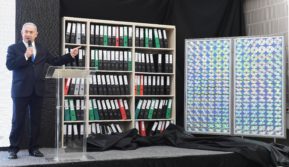
Illustrative photo of Netanyahu discussing Iran’s “secret nuclear files”. Photo courtesy of: Amos Ben-Gershom (GPO)
The Iranians on Monday announced publicly that they had exceeded the 300kg limit on enriched uranium imposed under the 2015 nuclear deal with the major world powers. While Iran claimed the move was their own response to Europe failing to hold up their end of the deal in economic benefits for Iran, Israel argued that the step explicitly violated the nuclear accord and called for Europe to resume sanctions as the deal’s prescribed penalty.
Iranian Foreign Minister Mohammad Javad Zarif officially confirmed his country had gone past the limit on nuclear fuel enriched to civilian-use-levels, according a report by the Fars News Agency, and he said the next step was to increase the enrichment level of uranium in the country. At low levels, enriched uranium is used for nuclear power plants and medical research, while very high levels are needed for nuclear weapons. Each step can build on each other, which Israeli Prime Minister Benjamin Netanyahu highlighted in his call to Europe to sanction Iran in response.
“Today Iran announced that it has violated its explicit commitment and crossed the threshold of 300 kg. of enriched uranium. Iran is taking a significant step toward producing nuclear weapons,” said Netanyahu on Monday in comments released by his office.
“…I reiterate: Israel will not allow Iran to develop nuclear weapons. Today, I again call on all the European countries: Uphold your commitment. You committed to act the moment Iran violated the nuclear agreement. You committed to imposing the automatic sanctions set out by the [United Nations] Security Council. Then I say to you: Do it. Just do it.”
The threat of Iran building nuclear weapons was further exposed last year when the Israelis unveiled a sizable Iranian nuclear information archive that made it clear they had sought a military application for their nuclear program and were retaining that knowledge, apparently for future use. Netanyahu on Monday said that that revelation had shown Iran’s true face in the nuclear issue.
“When we exposed the secret Iranian nuclear archive, we proved that any nuclear agreement with Iran is built on one big lie. Now even Iran acknowledges this,” said Netanyahu. “Soon will be revealed additional proofs that Iran has been lying this whole time.”
While the Iranians were publicly stating they had exceeded the nuclear fuel limits in the nuclear deal, known as the Joint Comprehensive Plan of Action (JCPOA), the United States declared that no amount of uranium enrichment was appropriate for Iran.
A statement from US Secretary of State Mike Pompeo, posted to the State Department website, highlighted that beginning in 2006, the United Nations Security Council had passed six resolutions calling upon Iran to cease all uranium enrichment.
“It was the right standard then; it is the right standard now. The Trump Administration calls on the international community to restore the longstanding nonproliferation standard of no enrichment for Iran’s nuclear program. Iran has the uncontested ability to pursue peaceful nuclear energy without domestic enrichment,” said Pompeo.
“The Iranian regime, armed with nuclear weapons, would pose an even greater danger to the region and to the world.”
Pompeo called the current Iranian efforts to pressure the Europeans into providing economic benefits, or risk further Iranian nuclear activity, extortion.
“The Iranian regime has taken new steps to advance its nuclear ambitions. The world’s leading state sponsor of terrorism continues to use its nuclear program to extort the international community and threaten regional security,” said Pompeo.
The Americans exited the 2015 nuclear deal last year and have resumed stiff sanctions on Iran. This came after repeatedly trying to negotiate an enhanced deal that addressed Iranian malignant activity, and the US has called for talks with Iran since then. On Monday, they offered again to negotiate with Iran, but warned of the consequences if Iran continued their current path.
Said Pompeo, “The United States is committed to negotiating a new and comprehensive deal with the Iranian regime to resolve its threats to international peace and security. As long as Iran continues to reject diplomacy and expand its nuclear program, the economic pressure and diplomatic isolation will intensify.”
(By Joshua Spurlock, www.themideastupdate.com, July 1, 2019)
